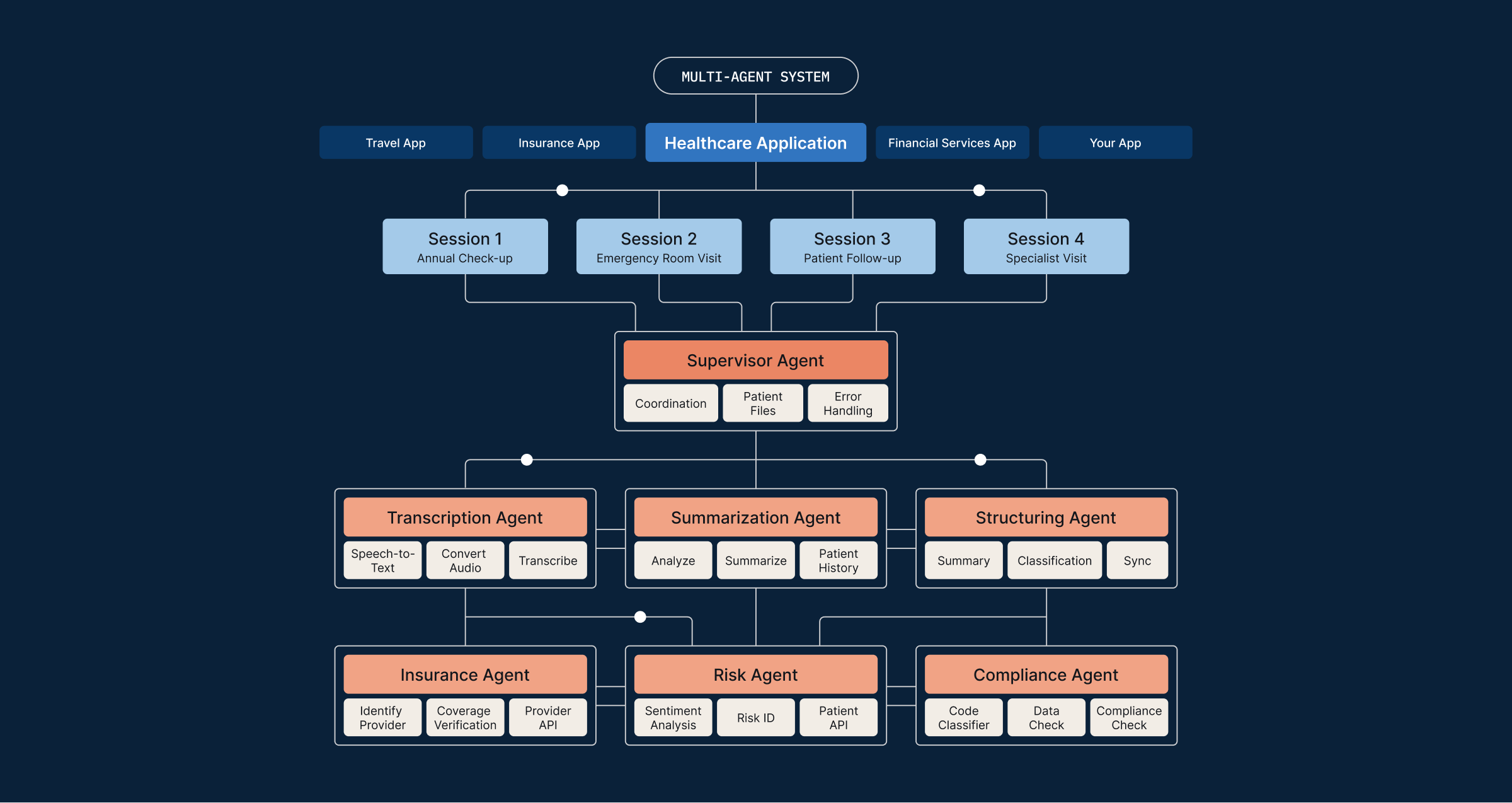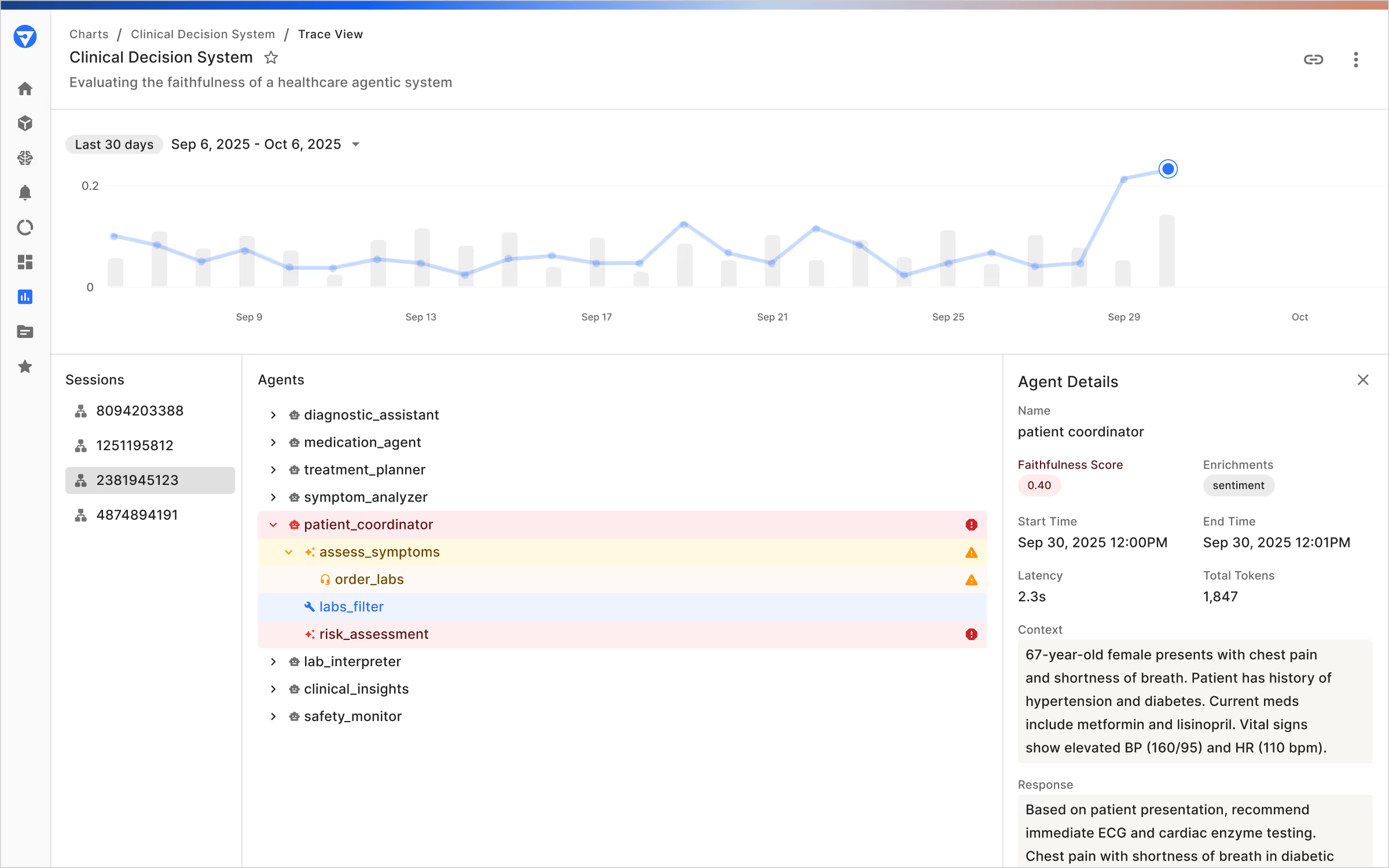Agentic AI in Healthcare: Driving Smarter Clinical Decisions and Patient Engagement
Min Read
Artificial intelligence is no longer a future concept in healthcare—it is actively reshaping how clinical systems operate, support decision-making, and deliver patient care. As the field evolves, a new generation of AI is gaining momentum: agentic AI. These intelligent systems reason through uncertainty, plan toward defined goals, and collaborate across teams and technologies to complete complex tasks with minimal human oversight.
Unlike traditional AI models that rely on fixed instructions, agentic systems are dynamic. They anticipate needs, adapt quickly, and coordinate across workflows and data sources. In healthcare, this represents a profound shift. Whether optimizing hospital operations, enhancing patient engagement, or improving clinical decision-making, agentic AI transforms how healthcare systems approach patient care.
Key Takeaways
- Agentic AI enables smarter clinical decisions and more personalized patient engagement.
- AI agents support real-time reasoning, planning, and coordination in complex healthcare workflows.
- Fiddler Agentic Observability ensures safe, accurate, and reliable deployment of multi-agent systems in healthcare environments.
Understanding AI Agents in Healthcare
Agentic AI in healthcare refers to intelligent systems with high autonomy, adaptability, and purpose-driven behavior. Unlike rule-based AI that produces fixed outcomes based on predefined instructions, agentic AI responds dynamically to context. It evaluates options, makes decisions, and initiates actions independently or in collaboration with other systems.
Key characteristics of agentic AI
- Autonomy: Functions independently without requiring manual input after deployment.
- Reasoning: Interprets complex data and situational variables to make informed decisions.
- Planning: Anticipates future outcomes and selects actions that align with defined objectives.
- Collaboration: Coordinates with other agents or systems to complete tasks that require cooperation.
Why This Matters in Healthcare
Healthcare systems are dynamic, high-stakes environments with many moving parts. Clinical decisions are time-sensitive, patient data is complex, and workflows span multiple departments. Agentic AI allows teams to handle this complexity, but its adoption also introduces challenges, including:
- Data privacy and compliance
- Safety and risk monitoring
- System-level visibility and control
- Trust and transparency
Types of AI in Healthcare
Healthcare leverages different AI systems, each with distinct capabilities and limitations. Here’s a breakdown of the most common types in use:
1. Rule-Based Systems
These systems follow predefined logic trees to guide decision-making (e.g., symptom triage bots).
- Pros: Predictable and safe for routine tasks
- Cons: Inflexible and unable to adapt to new or complex scenarios
2. Machine Learning Models
ML models analyze historical data and identify patterns, often supporting applications like diagnostic imaging or risk scoring.
- Pros: High accuracy when well-trained
- Cons: Typically narrow in scope and task-specific
3. Generative AI
Generative AI in healthcare refers to models that create new content such as text, images, or structured summaries. These systems are often used for tasks like summarizing physician notes, generating discharge instructions, or drafting patient communication.
- Pros: Flexible and capable of handling multiple data types
- Cons: May produce inaccurate or misleading outputs without proper safeguards
4. Agentic AI
Agentic systems operate independently, using reasoning and planning to achieve goals (e.g., autonomous care coordinators).
- Pros: Highly adaptive, scalable, and capable of coordinating across systems
- Cons: Complex to govern and monitor without robust observability tools
Emerging frameworks like LangGraph, Amazon Bedrock, and Crew AI are accelerating the development of agentic systems. However, deploying these technologies at scale requires more than functional infrastructure. Enterprise-grade implementations demand visibility, context, and control, where Fiddler Agentic Observability is critical.
The Impact of Agentic AI on Healthcare Systems
Healthcare organizations are increasingly adopting Agentic AI in healthcare to address long-standing challenges such as staffing shortages, care coordination inefficiencies, and extended patient wait times. These intelligent systems have the potential to streamline operations, reduce administrative burden, and ultimately improve patient outcomes.
Some areas of impact include:
Operational Efficiency
Healthcare AI agents can manage complex workflows such as triaging patients, scheduling appointments, and optimizing hospital logistics. These AI agents help reduce bottlenecks and improve throughput across departments by making real-time decisions based on data and resource availability.
They can also draw on a patient’s medical history and relevant medical knowledge to personalize responses and enhance decision-making.
Care Coordination
AI agents are vital in care coordination in multi-department surgical preparation or post-acute care scenarios. They can track patient progress, identify delays, notify appropriate staff, and ensure timely interventions. Their ability to process dynamic information across departments supports seamless transitions and better patient experiences.

Early Use Cases
Several agentic AI applications are already in use across healthcare environments.
- Virtual health assistants: Schedule follow-ups, collect pre-visit data, and support patient intake
- Clinical documentation agents: Summarize physician notes and EHR data to reduce charting time
- Hospital operations agents: Optimize room turnover, manage staff allocation, and reduce administrative overhead
These applications demonstrate how agentic AI supports clinical decision-making and operational performance, particularly in large, data-rich environments like hospitals and integrated health systems.
Download the Monitoring AI Agents in the Enterprise Healthcare guide to explore how healthcare organizations are deploying multimodal AI agents.
Enhancing Patient Engagement with Agentic AI
Patient engagement directly influences outcomes, satisfaction scores, and reimbursement rates. Agentic AI provides new opportunities for healthcare systems to create more responsive, proactive, personalized treatment plans.
Examples of Patient-Facing AI Agents
- Symptom checkers that adjust their questions in real time based on patient responses, improving triage accuracy.
- Appointment scheduling bots that autonomously find, book, and reschedule visits according to availability and patient needs.
- Personalized care agents that monitor medication adherence, send reminders, and follow up with patients between visits.
These AI agents continuously learn from interactions, remember patient preferences, and communicate more empathetically and context-awarely. Their adaptive behavior supports continuity of care, reinforces patient autonomy, and helps improve treatment adherence over time.
AI in Clinical Decision-Making
AI already supports healthcare providers by assisting in diagnoses, predicting patient risks, and recommending treatment options. Agentic AI builds on these capabilities by serving as a collaborative partner, actively reasoning through data, adapting to evolving scenarios, and contributing to decision-making in real-time.
Applications in Clinical Settings:
- Diagnostic Assistance: AI agents assess patient symptoms, compare them against known patterns, and identify potential anomalies that may require further evaluation.
- Treatment Planning: Systems propose care plans tailored to individual patients, accounting for comorbidities, prior treatments, and medication interactions.
- Predictive Analytics: Agentic models dynamically update risk scores (e.g., for sepsis or cardiac events) using real-time data from electronic health records, lab results, and vital signs.
The Importance of Transparency
Healthcare professionals must understand how and why an AI system provides a particular recommendation, especially when the stakes involve patient safety. Fiddler addresses this need through transparent observability, offering traceable decision paths, context-aware diagnostics, and interpretable insights.

Unlocking the Future of Healthcare with Agentic AI and Fiddler Observability
Agentic AI represents a strategic shift in the healthcare industry. Successfully deploying these systems requires more than intelligent algorithms; it demands deep visibility into how they operate.
This is where Fiddler Agentic Observability plays a critical role.
Why Fiddler?
Fiddler provides comprehensive, end-to-end visibility across every layer of the agentic AI stack, including:
- Application
- Session
- Agent
- Trace
- Span
This hierarchical observability enables healthcare teams to:
- Pinpoint root causes when agent decisions lead to unexpected outcomes
- Monitor system-wide performance with real-time insights
- Understand and explain agent behavior with interpretable metrics
- Mitigate risk through proactive alerts for hallucinations, unsafe inputs, or data drift
Effective monitoring of AI agents in enterprise healthcare settings is critical to ensuring reliability, transparency, and compliance. Fiddler’s observability platform enables continuous performance tracking and issue detection for AI agents, providing healthcare organizations with the tools needed to optimize their AI deployments.
To help healthcare enterprises successfully implement agentic AI, Fiddler provides a comprehensive AI observability checklist, ensuring every deployment meets operational, compliance, and safety standards.
Ready to transform your healthcare system with AI agents? Discover how Fiddler Agentic Observability gives you the visibility, control, and confidence to deploy them responsibly.
Frequently Asked Questions About Agentic AI in Healthcare
1. How does agentic AI impact healthcare?
Agentic AI improves healthcare by enhancing operational efficiency, streamlining clinical data workflows, and supporting more effective care delivery. By automating complex tasks and making context-aware decisions in real time, specialized agents help reduce administrative burden and improve patient outcomes.
2. How can AI improve patient experience and engagement?
AI improves patient engagement by delivering personalized experiences, timely follow-ups, and interactive tools encouraging proactive participation. Drawing from a patient’s medical history and real-time inputs, these agents support ongoing care and empower patients throughout their health journey.
3. How does AI support clinical decision-making?
AI enhances clinical decision-making by analyzing large volumes of patient information, including clinical trials, diagnostic data, and treatment history. It surfaces relevant insights, predicts outcomes, and recommends evidence-based options, enabling clinicians to make data-driven decisions.
4. What types of AI are used in healthcare?
Healthcare systems use various AI technologies, including rule-based systems, machine learning models, generative AI, and agentic AI. Agentic AI combines autonomy, reasoning, and collaboration through specialized agents that adapt to complex clinical environments.

